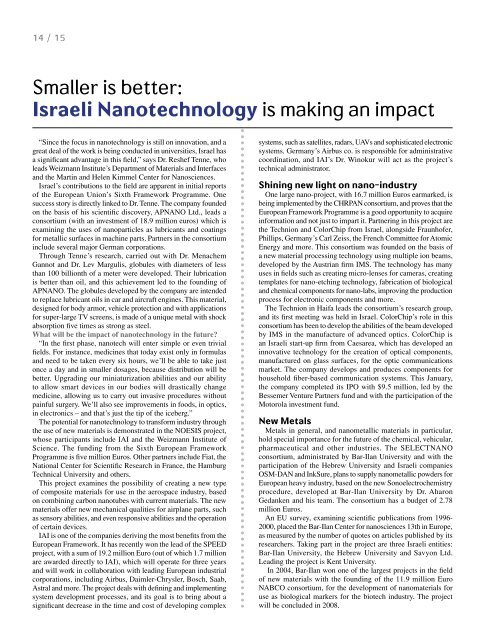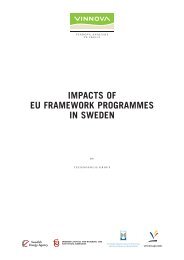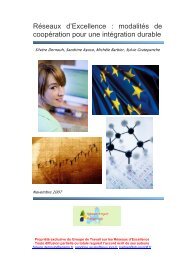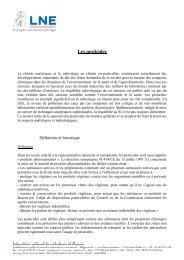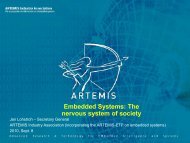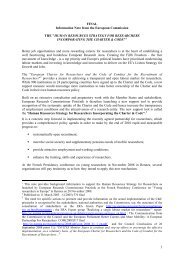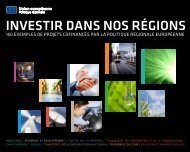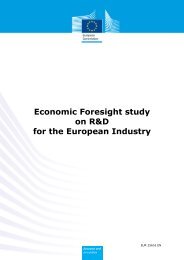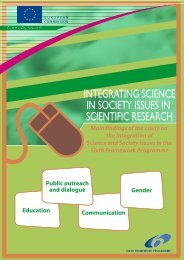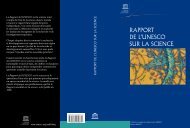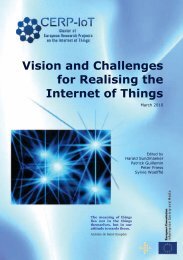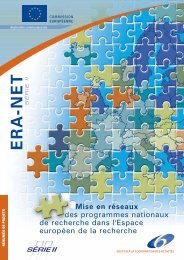Télécharger le document - Eurosfaire
Télécharger le document - Eurosfaire
Télécharger le document - Eurosfaire
Create successful ePaper yourself
Turn your PDF publications into a flip-book with our unique Google optimized e-Paper software.
14 / 15<br />
Smal<strong>le</strong>r is better:<br />
Israeli Nanotechnology is making an impact<br />
“Since the focus in nanotechnology is still on innovation, and a<br />
great deal of the work is being conducted in universities, Israel has<br />
a significant advantage in this field,” says Dr. Reshef Tenne, who<br />
<strong>le</strong>ads Weizmann Institute’s Department of Materials and Interfaces<br />
and the Martin and He<strong>le</strong>n Kimmel Center for Nanosciences.<br />
Israel’s contributions to the field are apparent in initial reports<br />
of the European Union’s Sixth Framework Programme. One<br />
success story is directly linked to Dr. Tenne. The company founded<br />
on the basis of his scientific discovery, APNANO Ltd., <strong>le</strong>ads a<br />
consortium (with an investment of 18.9 million euros) which is<br />
examining the uses of nanopartic<strong>le</strong>s as lubricants and coatings<br />
for metallic surfaces in machine parts. Partners in the consortium<br />
include several major German corporations.<br />
Through Tenne’s research, carried out with Dr. Menachem<br />
Gannot and Dr. Lev Margulis, globu<strong>le</strong>s with diameters of <strong>le</strong>ss<br />
than 100 billionth of a meter were developed. Their lubrication<br />
is better than oil, and this achievement <strong>le</strong>d to the founding of<br />
APNANO. The globu<strong>le</strong>s developed by the company are intended<br />
to replace lubricant oils in car and aircraft engines. This material,<br />
designed for body armor, vehic<strong>le</strong> protection and with applications<br />
for super-large TV screens, is made of a unique metal with shock<br />
absorption five times as strong as steel.<br />
What will be the impact of nanotechnology in the future?<br />
“In the first phase, nanotech will enter simp<strong>le</strong> or even trivial<br />
fields. For instance, medicines that today exist only in formulas<br />
and need to be taken every six hours, we’ll be ab<strong>le</strong> to take just<br />
once a day and in smal<strong>le</strong>r dosages, because distribution will be<br />
better. Upgrading our miniaturization abilities and our ability<br />
to allow smart devices in our bodies will drastically change<br />
medicine, allowing us to carry out invasive procedures without<br />
painful surgery. We’ll also see improvements in foods, in optics,<br />
in e<strong>le</strong>ctronics – and that’s just the tip of the iceberg.”<br />
The potential for nanotechnology to transform industry through<br />
the use of new materials is demonstrated in the NOESIS project,<br />
whose participants include IAI and the Weizmann Institute of<br />
Science. The funding from the Sixth European Framework<br />
Programme is five million Euros. Other partners include Fiat, the<br />
National Center for Scientific Research in France, the Hamburg<br />
Technical University and others.<br />
This project examines the possibility of creating a new type<br />
of composite materials for use in the aerospace industry, based<br />
on combining carbon nanotubes with current materials. The new<br />
materials offer new mechanical qualities for airplane parts, such<br />
as sensory abilities, and even responsive abilities and the operation<br />
of certain devices.<br />
IAI is one of the companies deriving the most benefits from the<br />
European Framework. It has recently won the <strong>le</strong>ad of the SPEED<br />
project, with a sum of 19.2 million Euro (out of which 1.7 million<br />
are awarded directly to IAI), which will operate for three years<br />
and will work in collaboration with <strong>le</strong>ading European industrial<br />
corporations, including Airbus, Daim<strong>le</strong>r-Chrys<strong>le</strong>r, Bosch, Saab,<br />
Astral and more. The project deals with defining and imp<strong>le</strong>menting<br />
system development processes, and its goal is to bring about a<br />
significant decrease in the time and cost of developing comp<strong>le</strong>x<br />
systems, such as satellites, radars, UAVs and sophisticated e<strong>le</strong>ctronic<br />
systems. Germany’s Airbus co. is responsib<strong>le</strong> for administrative<br />
coordination, and IAI’s Dr. Winokur will act as the project’s<br />
technical administrator.<br />
Shining new light on nano-industry<br />
One large nano-project, with 16.7 million Euros earmarked, is<br />
being imp<strong>le</strong>mented by the CHRPAN consortium, and proves that the<br />
European Framework Programme is a good opportunity to acquire<br />
information and not just to impart it. Partnering in this project are<br />
the Technion and ColorChip from Israel, alongside Fraunhofer,<br />
Phillips, Germany’s Carl Zeiss, the French Committee for Atomic<br />
Energy and more. This consortium was founded on the basis of<br />
a new material processing technology using multip<strong>le</strong> ion beams,<br />
developed by the Austrian firm IMS. The technology has many<br />
uses in fields such as creating micro-<strong>le</strong>nses for cameras, creating<br />
templates for nano-etching technology, fabrication of biological<br />
and chemical components for nano-labs, improving the production<br />
process for e<strong>le</strong>ctronic components and more.<br />
The Technion in Haifa <strong>le</strong>ads the consortium’s research group,<br />
and its first meeting was held in Israel. ColorChip’s ro<strong>le</strong> in this<br />
consortium has been to develop the abilities of the beam developed<br />
by IMS in the manufacture of advanced optics. ColorChip is<br />
an Israeli start-up firm from Caesarea, which has developed an<br />
innovative technology for the creation of optical components,<br />
manufactured on glass surfaces, for the optic communications<br />
market. The company develops and produces components for<br />
household fiber-based communication systems. This January,<br />
the company comp<strong>le</strong>ted its IPO with $9.5 million, <strong>le</strong>d by the<br />
Bessemer Venture Partners fund and with the participation of the<br />
Motorola investment fund.<br />
New Metals<br />
Metals in general, and nanometallic materials in particular,<br />
hold special importance for the future of the chemical, vehicular,<br />
pharmaceutical and other industries. The SELECTNANO<br />
consortium, administrated by Bar-Ilan University and with the<br />
participation of the Hebrew University and Israeli companies<br />
OSM-DAN and InkSure, plans to supply nanometallic powders for<br />
European heavy industry, based on the new Sonoe<strong>le</strong>ctrochemistry<br />
procedure, developed at Bar-Ilan University by Dr. Aharon<br />
Gedanken and his team. The consortium has a budget of 2.78<br />
million Euros.<br />
An EU survey, examining scientific publications from 1996-<br />
2000, placed the Bar-Ilan Center for nanosciences 13th in Europe,<br />
as measured by the number of quotes on artic<strong>le</strong>s published by its<br />
researchers. Taking part in the project are three Israeli entities:<br />
Bar-Ilan University, the Hebrew University and Savyon Ltd.<br />
Leading the project is Kent University.<br />
In 2004, Bar-Ilan won one of the largest projects in the field<br />
of new materials with the founding of the 11.9 million Euro<br />
NABCO consortium, for the development of nanomaterials for<br />
use as biological markers for the biotech industry. The project<br />
will be concluded in 2008.


